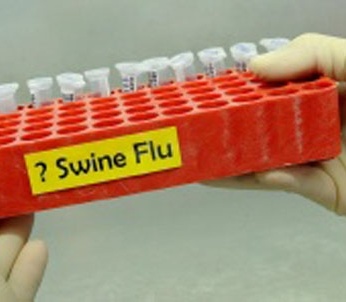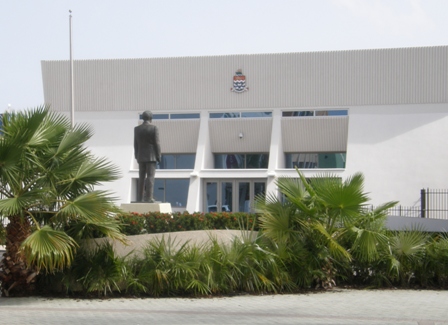Archive for July 16th, 2009

Cayman and Switzerland level on TIEAs
 (CNS): Having agreed a new tax treaty on Wednesday with its European neighbour Austria, Switzerland now has the same number of Tax Information Exchange Agreements in place as the Cayman Islands which signed its 11th deal with the Netherlands in The Hague last week. Both Cayman and Switzerland are now one short of the twelve deals which the OECD had said would be the minimum requirement to remove jurisdictions from the ‘grey’ to the ‘white’ list of what are defined as cooperative countries.
(CNS): Having agreed a new tax treaty on Wednesday with its European neighbour Austria, Switzerland now has the same number of Tax Information Exchange Agreements in place as the Cayman Islands which signed its 11th deal with the Netherlands in The Hague last week. Both Cayman and Switzerland are now one short of the twelve deals which the OECD had said would be the minimum requirement to remove jurisdictions from the ‘grey’ to the ‘white’ list of what are defined as cooperative countries.
The list was part of a naming and shaming of tax havens by the G20 nations in April of this year and has been at the centre of the international debate raging about the secrecy within the offshore sector since. Cayman went into the April G20 meeting with eight bi-lateral agreements in place but the previous administration had hoped the OECD would consider the 2008 legislation which had been passed to enable Cayman to sign unilateral agreements as and when required with other jurisdictions
Following the G20 meeting however, the OECD placed Cayman among other jurisdictions on the grey list and made a foot note that it would give the unilateral mechanism some consideration.
Since coming to office in May 2009 the new United Democratic Party Government has signed deals with Ireland, the UK and more recently Holland brining the total of deals to eleven. The first ever deal was signed in 2001 with the United States and another seven were signed in 2008 with Denmark, Faroe Islands, Finland, Greenland, Iceland, Ireland, Norway and Sweden.
Switzerland has so far initialled double-taxation treaties with Denmark, Luxembourg, Norway, France, Mexico, the United States, Japan, the Netherlands, Poland and Great Britain, according to a statement by the Swiss Finance Ministry. Luxembourg also stated that it had been removed from the grey list earlier this week it had been removed from the OECD list [IDn:nL8626056]. Belgium was also reportedly removed from the grey list this week after signing its twelfth agreement.

Students gain experience as summer interns
Over the course of his internship at OBS, Chevis has worked alongside key employees at OBS, learning about and assisting with several of the business’ primary functions including finance reconciliation, corporate management, database management and financial statement reviews.
“I have enjoyed my time at OBS,” commented Chevis in a dms release. “There was a lot to take in at first, but I have learned much about the offshore industry since the beginning of my internship. I plan to pursue a career in finance and I am looking forward to applying the knowledge that I have gained here to my studies.”
“OBS has enjoyed having Chevis on board this summer,” remarked OBS Client Accountant Angela Nightingale. “dms has always focused on supporting local education, and we have worked with many students at encouraging their future career aspirations. In addition to OBS, Chevis has had the opportunity to learn about other dms subsidiary and affiliate companies within dms House. He is flourishing during his time with us.”
 College student Jonathon Ebanks is gaining work experience and earning some money this summer working as an intern with Saxon Administration Ltd. (Saxon), agents for Silver Thatch Pensions, where he will gain insight into the inner-workings of pension administration as well as the financial industry. Throughout this time he will continue to acquire new skills as he participates in the company’s team meetings as well as attending client meetings with the CEO of Saxon, Brian Williams, offering direct exposure to the importance of maintaining strong customer relationships. (Right: Jonathon Ebanks and Shaneil Vassell with Brian Williams)
College student Jonathon Ebanks is gaining work experience and earning some money this summer working as an intern with Saxon Administration Ltd. (Saxon), agents for Silver Thatch Pensions, where he will gain insight into the inner-workings of pension administration as well as the financial industry. Throughout this time he will continue to acquire new skills as he participates in the company’s team meetings as well as attending client meetings with the CEO of Saxon, Brian Williams, offering direct exposure to the importance of maintaining strong customer relationships. (Right: Jonathon Ebanks and Shaneil Vassell with Brian Williams)
In addition to Ebanks’ shadowing of key employees, some of his daily responsibilities and duties include data input, research queries, maintaining the filing system and basic customer service practices, a release states.Facilitating Ebanks’ quest for work experience, Saxon is also able to fulfill its mission to give back to the community in which they operate.
Commented Williams, “Investing in our community, particularly our youth, is of paramount importance to Saxon. We recognize it to be core to our social corporate responsibility to support young Caymanians by giving them work experience and training opportunities while they are still in school, so they are as prepared as they can be before embarking on working life.”
Having earned an Associate’s degree in 2008 from Jefferson College in Missouri, Ebanks is currently studying at Wingate University, North Carolina and is pursing a Bachelor’s degree in Sports Management. Returning home for the summer, Ebanks is also a member of the Cayman Islands National under 23 team.
Acknowledging his commitments in the community, Saxon has offered Ebanks a flexible work schedule during his internship to enable him to continue his football training sessions in the afternoons.
Williams added, “There is immense value in the youth gaininginsight into the diverse sectors within the financial services industry as it is one of the key drivers of the national economy.”
Over the years Saxon has also accommodated work experience opportunities from students of the Young Parents’ Programme and the Chamber of Commerce Mentoring Cayman programme. Shaneil Vassell of the Chamber of Commerce Mentoring programme and year 12 student of John Gray High School and a Pathfinders member; is currently working for Saxon on a two-week paid internship. Vassell is being cross trained in a variety of areas such as administrativework and reception which includes dealing with customer services issues, as well as participating in daily meetings exposing her to the ins and outs of pension administration.
Further demonstrations of Saxon’s commitment to Cayman’s youth include its active involvement in Junior Achievement serving as advisors. Saxon is also about to launch its high-school based investment club.

Asylum for battered women
(New York Times): The Obama administration has opened the way for foreign women who are victims of severe domestic beatings and sexual abuse to receive asylum in the United States. The action reverses a Bush administration stance in a protracted and passionate legal battle over the possibilities for battered women to become refugees. In addition to meeting other strict conditions for asylum, abused women will need to show that they are treated by their abuser as subordinates and little better than property, according to an immigration court filing by the administration, and that domestic abuse is widely tolerated in their country. They must show that they could not find protection from institutions at home or by moving to another place within their own country.

Local flu stats continue to climb as virus spreads
 (CNS): Health authority officials say they are not surprised by the number of H1N1 cases in the Cayman Islands following confirmation of another five cases of the novel H1N1 virus (Swine flu). There have now been 43 cases, which experts say is in line with World Health Organization (WHO) and Centre for Disease Control (CDC) data that shows about 6% of populations are being affected by the virus in other parts of the world, and so far only one patient in Cayman has required hospital treatment.
(CNS): Health authority officials say they are not surprised by the number of H1N1 cases in the Cayman Islands following confirmation of another five cases of the novel H1N1 virus (Swine flu). There have now been 43 cases, which experts say is in line with World Health Organization (WHO) and Centre for Disease Control (CDC) data that shows about 6% of populations are being affected by the virus in other parts of the world, and so far only one patient in Cayman has required hospital treatment.
“We expect to see many more cases over the next few months. We have recently met with our regional Pan American Health Organisation (PAHO) representative Dr Ernest Pate to ensure that the strategies in place fit the current status of the pandemic,” said Acting Medical Officer of Health Dr Anna Matthews. “We are constantly reviewing our response, and will continue to follow international guidelines.”
She noted that, in line with the WHO and PAHO guidelines, the Health Services Authority is still recommending that anyone with flu-like symptoms remain in home isolation and limit social contact to contain the virus as best as possible. Dr Matthews added that to date most H1N1 patients in Cayman have been experiencing a mild illness and recovered at home without antiviral medications, but she confirmed that one patient with an underlying medical condition had experienced severe symptoms and was hospitalized as a precaution. This patient has since recovered and is doing well at home.
“This reinforces that the current pandemic H1N1 flu virus is no more concerning than the other three influenza viruses that continue to circulate in the Cayman Islands. If you are in general good health you do not necessarily need the care of a physician and can treat your symptoms with over-the-counter medications. However, if you have severe symptoms, such as shortness of breath, chest pain or wheezing, you should seek medical attention,” Dr Matthews advised. “Also, those with chronic illnesses or other underlying medical conditions, the immuno-suppressed, persons over the age of 65, pregnant women and children under 5 years of age should consult a doctor.”
Officials also asked people to think twice before asking doctors to prescribe Tamiflu as it is the only family of drugs that is effective in treating the H1N1 flu virus. Using it inappropriately is irresponsible as it increases the chance of the H1N1 flu virus becoming resistant to the drug. It may also cause some serious side effects and should only be prescribed in severe cases and to persons who fall into the high risk categories. Health experts also warned that Tamiflu is not effective in treating the other seasonal flu viruses in circulation, and will therefore not help if you are ill with the seasonal flu.
For more information, please call the Public Health Department at 244-2621/ 2648/ 2632 or the Flu Hotline at 926-2812.

Lawyer sees new paradigm
 (CNS): Local offshore legal expert and Ogier partner, James Bergstrom has said that in future only jurisdictions that meet certain regulatory and tax transparency requirements will be operating in the global financial system. "Transparency is the new paradigm," Bergstrom who is based in Cayman told members of the Hedge Funds sector at a global investment funds seminar recently.
(CNS): Local offshore legal expert and Ogier partner, James Bergstrom has said that in future only jurisdictions that meet certain regulatory and tax transparency requirements will be operating in the global financial system. "Transparency is the new paradigm," Bergstrom who is based in Cayman told members of the Hedge Funds sector at a global investment funds seminar recently.
According to Hedge Funds Review an industry website the seminar looked at the past, present and future of offshore investment funds, including proposed structuring and language clarification, the current litigious climate and the issues surrounding claims against funds and their service providers and the various international regulatory initiatives.
"In the near future only those offshore financial centres which meet the regulatory and tax transparency requirements of the new Financial Stability Board will be permitted to participate in the international financial system," Bergstrom added
His Cayman colleague at Ogier, partner Peter Cockhill also noted that Hedge fund managers naturally seek international as well as national investors. “To continue to do so in today’s evolving regulatory environment, managers are likely to need to establish operations in the EU for EU domiciled investors, in the US for US investors and offshore for international investors," he said.
The Ogier seminar which formed part of a series traced the origins of the current international initiatives back to 1996 when the OECD’s harmful tax practices project was launched. By analysing the development of the different initiatives since then, Ogier said it is possible to discern the key criteria that will need to be met by offshore financial centres (OFCs) and the offshore funds domiciled there.
"The number of OFCs in which they can be domiciled is likely to decrease," said British Virgin Island (BVI) partner Simon Schilder. "The changes in the regulatory landscape will mean that only those OFCs that adapt to meet the new internationally mandated criteria on regulation and tax transparency will survive as structuring and administration centres for offshore funds."
Schilder said the costs of regulator-to-regulator reporting and the ongoing scrutiny by international bodies is likely to be prohibitive for many OFCs. However," the status of the pre-eminent OFCs such as the Cayman Islands, BVI and the Channel Islands, should be enhanced by the coalescence of international standards," Schilder added.

Jury hears brutal details
(CNS): Against a backdrop of accusations hurled at the police for either conspiracy or incompetence the jury was reminded, on Wednesday, of the gruesome nature of the murder of Brian Rankine-Carter on 17 May 2008. On the final day of the Crown’s case against William Martinez-McLaughlin, who is charged with the murder, the court heard from a number of expert witnesses, including a DNA witness who explained his findings which connected McLaughlin and Hinds to the scene, as well as the pathologist who had completed the post mortem on the young man’s body. Dr Bruce Hyma told the court that some 48 wounds were inflicted on Rankin-Carter, including one which almost severed his spinal cord in two.
The doctor gave a detailed account of each of the wounds, which consisted of 22 puncture wounds mainly around the neck and head and then some 26 various chop and incise wounds to the upper body and arms. He explained how six overlapping chop wounds to the right side of the neck resulted in a gaping wound nine by two inches where the Carotid artery and jugular vein, as well as the spinal cord had been cut through almost severing it in two. The doctor also described many other severe wounds, including one chop wound to the head which had penetrated the brain tissue as well as chop wounds amputating the ear lobe. He said that Rankine-Carter’s jaw and arm bone were also crushed as a result of the chop wounds.
He said the cause of death was multiple chop wounds to the head and neck. He noted that because the body had suffered numerous chopping, crushing as well as incise injuries, the murder weapon was likely to be something like a machete, an axe or a meat clever – a weapon that was both sharp and blunt. He told the jury that the puncture wounds, which were mostly superficial wounds, were probably made with something akin to a scratch-all (a tool for scratching metal surfaces) or an ice pick.
The Doctor revealed to the court that a piece of the vertebrae from the victim was saved from the autopsy. He explained that because of the severity of the chopping tool marks were left on the bone which he preserved for evidence purposes should a potential weapon be found, enabling a tool mark expert to make a match. During the cross examination McLaughlin’s defence attorney took the opportunity once again to highlight that there had never been a weapon for any expert to make comparisons.
The morning’s DNA expert, Dr John Farris from Cayman’s own laboratory, took the jury through his findings and confirmed that DNA matches had been made on the cap found at the murder scene with McLaughlin and Rankine, as well as the defendant’s boots, which were discovered in bushes near the defendant’s house in East End. He said McLaughlin’s wallet, which was taken from him when he was arrested, also contained blood which matched the victim.
He said that matches had also been made to Rankine on the boots and clothes of the principal witness Jason Hinds. However, the expert said he had only confirmed the presence of blood sufficient to make a full DNA profile which matched with Rankine on Hinds’ T-shirt in one place despite making some five tests to different areas. The DNA expert also confirmed that he had received two late exhibits for testing last week, including the machete found at the house of Jason Hinds, which he said did not reveal traces of blood. He also stated that the jeans McLaughlin was wearing on his arrest were also tested last week but had not revealed any blood.
During the day’s testimony the jury was also read a number of other admissionsfrom various technical witnesses, as well as a written admission from Ronnie Pollard, the RCIPS scene’s of crime officer who had allegedly videoed Hinds’ visits to the crime scene and the scenes where he had told police that McLaughlin had disposed of various items connected to the crime. In the admission Pollard says that although he searched high and low for the video, it could not be found and he admits that it could well have been tapped over during the filming of another murder scene which occurred within a few days following the Rankine murder.
The jury also heard that DCS Lauriston Burton, who was taken ill during his testimony on Tuesday would not be returning to the stand as he was in hospital. However his notes were submitted in evidence and an admission was read by the defence regarding the machete taken from Hinds’ house enabling the machete to be formally submitted in evidence. The defence also noted a mistake to the jury in the statement taken by Burton from Hinds which was initialled by him.
At the end of the day’s proceedings the Crown told Justice Henderson that its case was complete and the trial was adjourned until 10:00am Thursday morning when the defence is expected to proceed.

Keep homes rat free
 (CNS): One healthy pair of rats can produce about 15,000 offspring in one year alone. Rodents can carry diseases such as leptospirosis, trichinosis, salmonellosis, rat-bite fever, and many other diseases. Besides carrying diseases, rodents can also destroy property. By gnawing electrical wires, they can cause fires. Once inside your home or property, they eat and contaminate food items. Department of Environmental Health (DEH) staff are therefore asking the public to be vigilant about keeping properties rodent-free this summer.
(CNS): One healthy pair of rats can produce about 15,000 offspring in one year alone. Rodents can carry diseases such as leptospirosis, trichinosis, salmonellosis, rat-bite fever, and many other diseases. Besides carrying diseases, rodents can also destroy property. By gnawing electrical wires, they can cause fires. Once inside your home or property, they eat and contaminate food items. Department of Environmental Health (DEH) staff are therefore asking the public to be vigilant about keeping properties rodent-free this summer.
But because they are agile and adaptive, it can be difficult to prevent rodent infestation. They have a vertical jump of about two feet, and can walk along electrical wires. Rodents also can survive falls of 50 feet; swim several miles; and crawl through one-half inch holes. They also can cut through screens, doors and floors.
Signs of infestation are droppings and urine odours; gnaw marks, rub marks or smears along walls; and burrows in the ground or runways.
The most common rats found in the Cayman Islands are the brown rat, roof rat and house mouse. These are easily identified by their colours. In addition to its brown coat, the brown rat has a white abdomen. The roof rat is blackish-grey, with a white abdomen. The house mouse is brownish-grey, with a brownish-grey abdomen.
Rodent infestations increase when people carelessly dispose of their garbage: For example, littering and dumping are prime causes. Other significant causes are tossing kitchen wastewater outside; overgrown vegetation; derelict vehicles; having discarded appliances and piles of debris in yards; dilapidated buildings, and leaving pet food outside.
Residents can prevent rodent infestation by practicing good sanitation. Property owners need to keep their properties clean, and to store garbage in covered containers until it is collected by the Department of Environmental Health.
Also, remove all old appliances, derelict vehicles, unused zinc and boards from your yards and properly dispose of them at the landfill. Cut down heavy, overgrown vegetation around your yard; and demolish all dilapidated structures, taking care to properly dispose of the debris.
Homeowners can rodent-proof their homes by ensuring that doors fit tightly. Using metal collars around coconut and fruit-tree trunks; repairing all holes in floors and walls; and removing all overhanging branches near your home also help.
If you need help in controlling rodents around or in your home, DEH offers rodent control services upon request to all residences and institutions in Grand Cayman. In the Sister Islands, DEH rodent-control services are available to residences and commercial property owners. When DEH staff arrive, it is important to co-operate by allowing them to apply rodenticide (rat poison).
DEH conducts intensive rodent control baiting once a year on all three islands. If you suspect that rodents are on your property, please contact DEH staff at 949-6696 to file a complaint.

Unlicensed firm guards LA
 (CNS): The police have issued a reminder to local security companies, technicians and guards to contact the RCIPS Security Licensing Department to make sure they are complying with the law. However, CNS understands that the government itself is being guarded by unlicensed firms. For ten years the security detail at the Legislative Assembly was undertaken by The Security Centre Ltd (TSCL) a firm which is licensed. However, following the General Election in May the firm has been replaced by National Security Services (NSS) which is not a licensed firm.
(CNS): The police have issued a reminder to local security companies, technicians and guards to contact the RCIPS Security Licensing Department to make sure they are complying with the law. However, CNS understands that the government itself is being guarded by unlicensed firms. For ten years the security detail at the Legislative Assembly was undertaken by The Security Centre Ltd (TSCL) a firm which is licensed. However, following the General Election in May the firm has been replaced by National Security Services (NSS) which is not a licensed firm.
A spokesperson for The Security Centre said the firm has not yet been officially informed that their services are no longer required. However, following a call to the LA, TSCL was told that staff there had been instructed to contract a different security company. The unlicensed firm, NSS, which has supplied guards for the most recent sessions of the Cayman Islands parliament, was the company for which United Democratic Party George Town candidate Pearlina McGraw-Lumsden was a director before she resigned her position during the election campaign.
Although a number of firms have gained licenses since the police issued a 31 May list in response to an FOI request, NSS is understood not to be one of them. There are also a number of other government institutions believed to be being guarded by unlicensed firms. There are an estimated 40 or more firms now calling themselves security companies or supply guard services and generating around $300 million per year. The industry has gained a reputation for not only exploiting workers and paying exceptionally low wages but for not complying with employment laws.
The Private Security Services Law (2007) came into effect on 1 September 2008 and it requires security companies, technicians and guards to be licensed with a regulatory body. The law was created to not only protect companies and members of the public but also to enable the regulatory body to ensure that satisfactory employment conditions and rights are implemented and maintained within the industry. It was designed to both regulate the security industry and improve standards of service delivery.
The Security Licensing Department, headed by Chief Inspector George Watson, processes all applications and comprises a security licensing administrator (to whom all queries should be addressed) and a senior police constable. Licenses are provided by the department to companies that comply with all relevant laws, such as the National Pensions Law, the Health Insurance Law, the Labour Law and the Immigration Law. To date, many of the recognized companies in the Cayman Islands have been working with the Security Licensing Department to comply with all the necessary terms and conditions required for licensing.
The department, however, said it would like to remind all security personnel that they need to get in touch as companies which have not complied with the law could face prosecution. This also applies to individuals who have classified themselves as “Loss Prevention Officers”, which are also required to be licensed by thedepartment.
The law states: 1) It is an offence for a person to operate a Security Company, or to hire anyone as a Security Guard or Security Technician without a license. Anyone who breaches the law is liable on conviction for a fine of up to CI$5000.
Police urged anyone operating a security service who has not yet contacted the department should do so immediately by calling 945-4924 ext. 5912. More information can also be found on the RCIPS website.